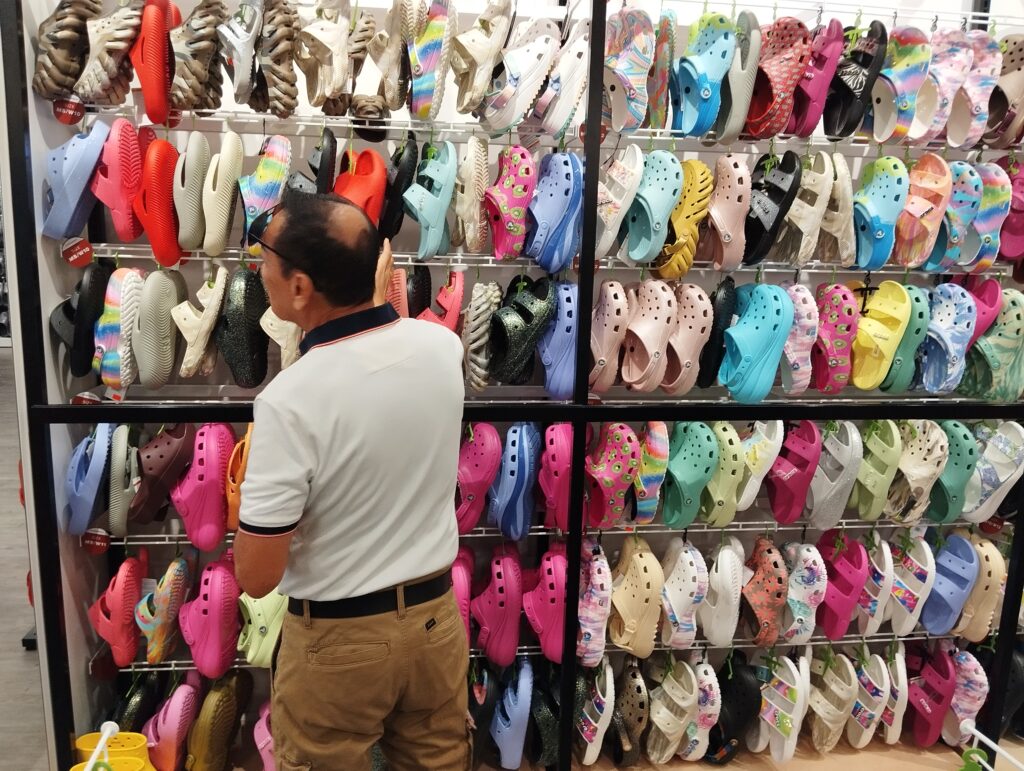Text and Photos by Evangeline T. Capuno
People, especially women, love to shop. As Tammy Faye Bakker once said, “I always say shopping is cheaper than a psychiatrist.” Rebecca Bloom agrees: “I love shopping. There is a little bit of magic found in buying something new. It is instant gratification, a quick fix.”
Hollywood bombshell Bo Derek has this to say: “Whoever said money can’t buy happiness simply didn’t know where to go shopping.”
Men shop, too. But there’s a difference between men and women when they go shopping. An unknown author offers this explanation: “Men go shopping to buy what they want. Women go shopping to find out what they want.”

But there’s another side of shopping – and that’s shoplifting. And it’s not good. Carrie-Anne Moss admitted, “I shoplifted. I was about five years old, and I took candy from a store. We paid for three of them, but I took four, and I went home and cried. My mother took me back, and I paid for the missing piece.”
David Sedaris also knows the feeling of being a shoplifter. “I am a person who feels guilty for crimes I have not committed or have not committed in years. The last thing I stole was an eight-track tape, but to this day I’m unable to enter a store without feeling like a shoplifter. It’s all the anxiety with none of the free stuff.”
Actually, there are two kinds of shoplifters: professional and amateur or casual shoplifters. The professional shoplifters are those who usually take expensive items, like clothing and jewelry that they can resell easily.
Amateur or casual shoplifters make up the majority of shoplifters. Studies have shown that about 70% of the time, casual shoplifters don’t go into a store with the intention of stealing – they simply see the opportunity to take something and do it.
Girls are more likely to do shoplifting than boys. A study in the United Kingdom – where more than two in 10 shoplifters are under 18 – showed 7,528 girls aged 13-15 were caught shoplifting. In comparison, there were only 6,370 boys of the same age doing the same thing.
In the Philippines, shoplifting is also very common. Some years back, a Philippine Daily Inquirer report said that a 32-year-old woman from Binan, Laguna was arrested after a security guard found in her tote bag several toothbrushes worth over P5,000 she allegedly stole from a supermarket in Quezon City.
There was also the case of a woman who shoplifted a pair of shoes worth P900+ in a mall. “I was brought into the security office and made me fill-up a form writing a statement that I was invited in their office and would pay for the goods that I had ‘forgotten’ to pay,” she recalled.
“I was so scared and shaking while I was filling-up the form. The investigator told me what was going to happen: he said I had to pay the amount for the shoes and was still not able to get the shoes. I begged him to pay the exact amount of the shoes and not double, but he said it was not alright because that was their policy.”

There are many reasons why casual shoplifters steal, studies show. For teenagers, peer pressure can be a factor; they want to have the same expensive, stylish clothes they see their classmates wearing. Some people may also shoplift to prove that they fit in with friends who shoplift.
Unfortunately, many people who shoplift can’t explain why they do it. More often than not, they have enough money in their pockets to pay for the items that they steal. In fact, they also know that it’s wrong to shoplift and expect to be punished if they’re caught.
Shoplifting experts believe that these people are “acting out” by using shoplifting to relieve painful emotions, such as stress. Teenagers whose parents are going through marriage separation, for example, may turn to shoplifting because of the feelings of loss they’re going through.
Others may use stealing as a way of getting back at someone, like a parent or a friend, who has hurt them. Shoplifters are also frequently bored or depressed.
Experts at the Shoplifters Anonymous in the United States say that teens also shoplift because they: think the stores can afford the losses; think they won’t get caught; don’t know how to handle temptation when faced with things they want; feel peer pressure to shoplift; and don’t know how to work through feelings of anger, frustration, depression, unattractiveness, or lack of acceptance.
Many people think that shoplifters have a mental disorder or that they must really need the items they are shoplifting to survive. But kleptomaniacs (people who feel compelled to steal) or people who steal because they’re hungry and desperate only make up a tiny percentage of shoplifters.
Some recent studies have found that it’s possible for people to become addicted to shoplifting – like they do to alcohol or drugs.
For these people, shoplifting means more than simply stealing items. It also robs them of their lives.
Dr. Jon Grant, an American psychiatrist who has treated hundreds for this kind of addiction, says, “The craving is so strong, much like an alcohol craving or craving for heroin, that they really feel out of control, they feel almost like robots.”
Terry Shulman, an American attorney, author and recovering shoplifter, agrees. “I was so out of control, I scared myself. I couldn’t believe what I was doing,” he says. “And I actually contemplated suicide.”
Among shoplifters, the inability to stop stealing is very common. “After people become addicted to shoplifting, they will actually become agitated and anxious and won’t sleep, because they have got these cravings or these urges to shoplift and when they can’t do it, it affects them,” says Dr. Grant.
According to Dr. Grant, it is taking a long time for people to recognize it as an addiction because people don’t come forward and talk about it because of the shame and guilt associated with the behavior.

Also, shoplifting is a crime and mental health professionals often don’t want to get involved in criminal behavior.
Now, if you ever caught your friend shoplifting, what should you do?
“It’s not easy to confront a friend and ask about shoplifting,” says Dr. Mary Gavin, an American psychologist. “Try saying that you’re concerned, and that you don’t want your friend to get hurt in the long run. You could suggest possible resources to break the habit. And if your friend won’t stop, be sure that you avoid shopping together.”
Another possibility: If you are concerned about a friend – or if you have a problem with shoplifting – ask an adult you feel comfortable talking to for help finding shoplifting treatment programs.
Still another: Encourage your friend to get help for any underlying problems like depression that may be the source of the shoplifting problem. – ###








